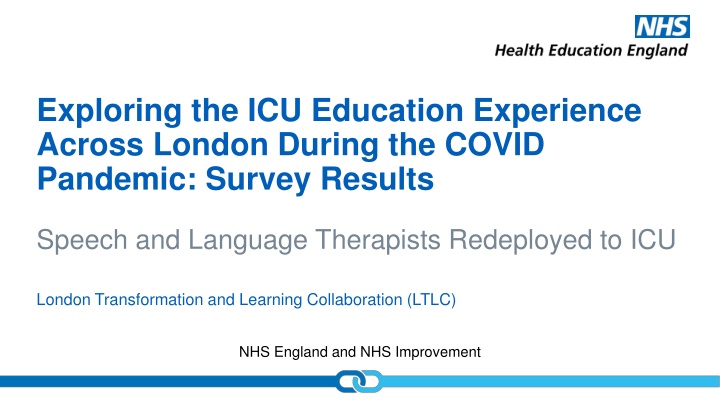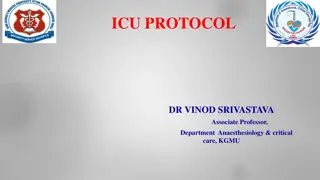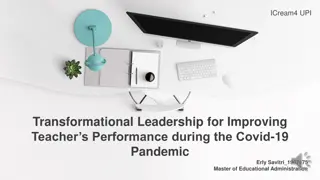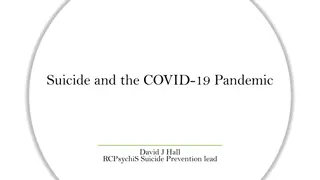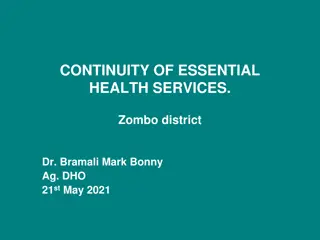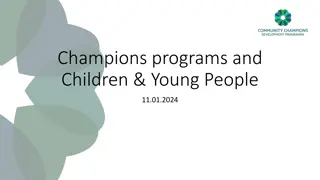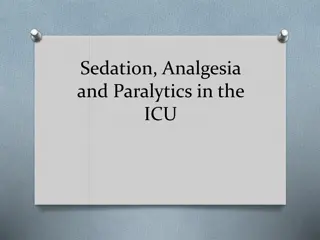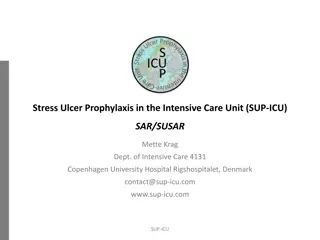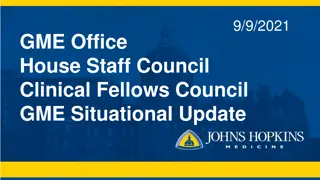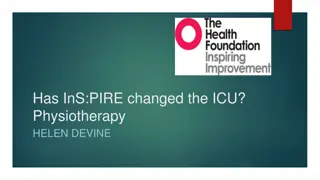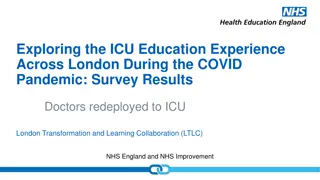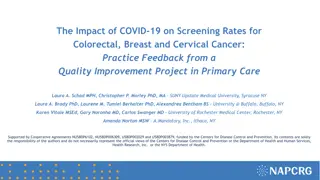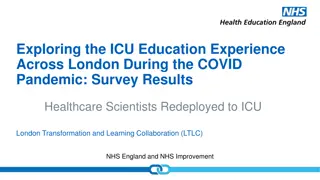ICU Education Experience in London During COVID Pandemic
Survey results on Speech and Language Therapists redeployed to ICU in London, part of the LTLC initiative aiming to enhance staff capabilities and critical care capacity in response to COVID-19. Explore training experiences, preparedness, challenges, and innovations across ICUs in London.
Download Presentation

Please find below an Image/Link to download the presentation.
The content on the website is provided AS IS for your information and personal use only. It may not be sold, licensed, or shared on other websites without obtaining consent from the author.If you encounter any issues during the download, it is possible that the publisher has removed the file from their server.
You are allowed to download the files provided on this website for personal or commercial use, subject to the condition that they are used lawfully. All files are the property of their respective owners.
The content on the website is provided AS IS for your information and personal use only. It may not be sold, licensed, or shared on other websites without obtaining consent from the author.
E N D
Presentation Transcript
Exploring the ICU Education Experience Across London During the COVID Pandemic: Survey Results Speech and Language Therapists Redeployed to ICU London Transformation and Learning Collaboration (LTLC) NHS England and NHS Improvement
Purpose of the London Transformation & Learning Collaborative (LTLC) We want to assist system working and move forward in a way that will support growth and optimise effectiveness. Work collaboratively Share best practice across organisations, systems and the region Enable colleagues to be more prepared to work in an expanded critical care as well as in the event of a second surge thereby improving staff experience Support each other in improving patient outcomes Providing training content and structure that can be delivered consistently and effectively | 2
About the LTLC Programme: Purpose To increase the supply and resilience of staffing for critical care across London To develop a London plan that seeks to ensure that the NHS workforce is equipped with the skills and capabilities to manage existing demand, potential future spikes in demand as a result of Covid-19 and longer-term permanent expansion of critical care capacity in London. Primary outcome To cross-skill staff to support the London region to expand ICU capacity with the potential to open more critical care beds in surge Scope Develop clinical education transformation capability across the NHS in London: Develop transformation programmes which align to patient need, service model, and workforce models. Co-ordinate design and delivery of training to support London s response to Covid-19: Establish innovative education delivery models that will support the development of an agile workforce that has the robust capability to deal with a second surge. | 3
Survey Aims and Research Questions Aim: Explore education experiences of those who worked in ICUs across London during the COVID pandemic; both those who worked in ICU and those who were redeployed to ICU Research Questions: 1 2 3 ICU staff receiving education Demographics Useful elements of training Elements of preparation that were missing What would you do differently? ICU staff delivering education Non-ICU/Redeployed staff Useful elements of training Training that was missing Useful things learnt (how and from who) Steepest learning curve (how it was overcome) Training resources used What would you do differently? Advice to a colleague going to work in ICU Demographics Education successes Education challenges Useful professional groups Support needed for a second surge Would collaborating with other ICUs help? Training resources and IT systems used 179 responses 138 responses 616 responses | 4 Total = 933 responses
Survey Results: Reponses from Speech and Language Therapists that were redeployed to ICU during the pandemic Total = 28 Responses *Resources that were suggested in the survey responses are being collated separately and are not discussed in this summary | 5
Redeployed Speech and Language Therapists: Area and Location Response Rates by Area of London Normal Area of Work No. Banding No. Community Paediatrics Inpatients Community Mental Health Outpatients TOTAL 14 8 4 1 1 28 Band 5 7 South West Band 6 10 North Central Band 7 5 Band 8 5 South East Other 1 North West North East | 6
Q1: During the initial COVID response what was the most useful and important elements of training you received? ICU Skills and Knowledge General Proning 10 Orientation to ICU 8 PPE 9 Hands-on training 6 Observations 4 Had no training/minimal training 5 Patient care 2 Support from staff 2 Ventilators 2 Equipment 1 Suctioning 1 Patient assessment 1 | 7
Discussion Q1: During the initial COVID response what was the most useful and important elements of training you received? Many speech and language therapists said that they did not receive any training before redeployment, or very minimal training We had an hour's training before our first shift on how to turn a patient on a ventilator. The rest was training 'on the job' Band 7 redeployed SALT, NWL Elements of training that were deemed most useful were: proning, PPE, patient observations (taking and interpreting) and patient care Orientation to ICU was deemed to be very useful and many discussed the importance of hands-on training and shadowing within ICU A "welcome tour" by nurse in charge with other people who were redeployed, to look at a dummy person in a bed, try out suctioning, look at central line, try pressing buttons on ventilator not connected to a real person, time to ask questions in front of other new people Band 5 redeployed SALT, NCL On the job training from nurses and doctors. The induction day was helpful as well but too rushed Band 6 redeployed SALT, SWL | 8
Q2: What do you wish you had known more about / had more specific training before you worked in CC? ICU Skills and Knowledge Other Patient observations/monitoring 10 Orientation to ward, role and team structure 10 Proning and manual handling 7 ICU terminology 3 Patient care 5 Psychological support 3 Ventilators 5 Nothing 2 Patient assessment 2 More training generally 2 Suctioning 2 Lines 2 PPE 1 ABGs 1 | 9
Discussion Q2: What do you wish you had known more about/ had more specific training before you worked in CC? Elements of training felt to be lacking were: interpretation of patient observations and monitoring, proning and manual handling, aspects of patient care, assessment of an ICU patient and suctioning How to read the monitors and complete the monitoring form before starting. I would like to have known critical levels for the readings on monitors and bloods so to know when to alert the nursing staff Redeployed SALT, band 8, NCL Practical training on how to support nurses e.g. how to take obs, empty a catheter etc Redeployed SALT, band 5, NCL Orientation to the ICU ward and the role was felt to be lacking. Many commented that the role expectations were not known by them or other staff groups It s also really important that the nurses are aware of what our role entails and what jobs we are unable to do Redeployed SALT, band 5, NCL I knew nothing about CC and had never stepped foot in an ICU until my first shift. It would have been helpful to have known what the different lines and machines were, what the types of ventilation were, even just the names of things the first few shifts I was going in completely blind Redeployed SALT, band 6, SEL | 10 Psychological support was felt to be lacking
Q3. What were the most useful things you learnt whilst looking after patients in CC?* Who did you learn this from and how? Useful Things Learnt From Who and How Nurses Colleagues generally On the job Physiotherapists Doctors Self-directed learning 18 13 8 6 3 1 Communication Patient observations Proning and moving and handling Patient care Tracheostomy Ventilation/ventilators Teamwork ABGs ECGs Patient dignity Equipment generally ICU medication 11 9 6 6 4 3 3 2 2 2 2 2 | 11 *Themes with only 1 response not included
Discussion Q3: What were the most useful things you learnt whilst looking after patient in CC? Who did you learn this from and how? It was felt that most learning occurred within ICU as opposed to during formal training Patient observations (mainly interpretation), proning, tracheostomy care and providing patient care were felt to be the most useful skills learnt on ICU Non-technical skills including communication (mainly between colleagues) and teamwork were also useful skills learned within ICU Nursing staff and other ICU colleagues were the greatest source of knowledge for redeployed speech and language therapists, although many commented on the how much was learnt on the job generally from a SLT perspective it was a useful experience in the challenges of communicating with severely ill patients who were unable to speak and in may cases were very confused and disorientated Redeployed SALT, band 5, NCL I became more familiar with equipment used in CC as well as with tracheostomy management and hygiene Redeployed SALT, band 6, NWL | 12
Q4a: What were the steepest learning curves you faced on redeployment? How did you overcome them? How were they overcome? Skills and Knowledge Other Colleague Support Shadowing/Observing Internet including apps Debriefs Counselling Specific SALT resources Support from Trust Self-care 20 4 3 2 2 1 1 1 Patient care PPE and infection control Patient observations Proning and manual handling Difficult conversations 8 New environment and role 7 Psychological Stress 2 Physical stress 2 ICU terminology 2 Workload 16 9 5 2 2 | 13
DiscussionQ4: What were the steepest learning curves you faced on redeployment? How did you overcome them? Providing patient care and PPE and infection control were the steepest skill related learning curves Everything involved in patient care in ICU Redeployed SALT, band 8, NCL The lack of knowledge about the new working environment and the expectations of the role were commonly discussed Learning the names for medical equipment and where things were kept, the set up on ICU and what different people's roles were Redeployed SALT, band 7, NWL Coping with psychological and physical stress were steep learning curves for many o Physical stress included fatigue, dehydration and wearing PPE How to support the nurses in any way - quite exasperating as I did not feel I was much use and they were so busy Redeployed SALT, band 5, NCL Colleagues were crucial to managing the steep learning curves Probably just the environment. It was very overwhelming Redeployed SALT, band 6, SWL | 14
Q5: What would you do differently if you had to go back to your initial redeployment? Many said they would be more confident from the beginning as well as ask more questions Responses No. Be more Confident Ask more questions Nothing Have more training Do more self-directed study Know role expectations ICU orientation Better self-care Equipment orientation Understand patient observations Not go back to ICU 5 5 5 4 4 4 4 3 2 2 2 Be more confident with my opinion I didn't feel confident to speak up until a few shifts in. Also using my skill set to do more, e.g. oral care Band 6 redeployed SALT, NWL ask more specific questions in training and about the process Band 5 Redeployed Nurse SWL Many said that they wouldn t do anything differently whilst others said that they would like more training Some said they would do more self-directed learning Knowing the role expectations was important Looking after themselves better with the aim of reducing stress and anxiety was mentioned | 15
Q6: What is the one piece of advice you would give a colleague going to work on CC? Not being afraid to ask questions or ask for help was the most common advice Responses No. Ask questions/as for help Ensure psychological support Don t do anything you re not comfortable with Care for others Self-care Ensure ICU orientation Be compassionate 10 7 5 5 4 3 1 Looking after yourself psychologically and physically was mentioned and included things such as drinking plenty of water and good sleep hygiene Improving knowledge before and during redeployment was commonly advised Make sure you have supervisions and debriefs, it can be very emotionally & mentally challenging and it's important to look after yourself and your colleagues! Band 5 redeployed SALT, SWL Look after yourself and talk about what you are seeing with colleagues (family/friends if feel able) in order to deal and make sense of it Band 7 redeployed SALT, NCL | 16
Conclusions: There was a lack of training prior to redeployment for speech and language therapists The most important elements missing were: interpretation of patient observations and monitoring, proning and manual handling, aspects of patient care, assessment of an ICU patient and suctioning It was commonly mentioned that most learning and training happened within the ICU environment There was a lack of local induction and orientation to the ward prior to redeployment There was a lack of knowledge about the new role for speech and language therapists Non-technical skills including communication (within a team as well as to patients) and teamwork were deemed important and some mentioned the lack of training on these Coping with psychological and physical stress were steep learning curves of redeployment | 17
The LTLC: Education Workstream The LTLC are using these survey results (as well as focus groups) to inform the following: Support role definition Share Education Content Create a Skills Passport Publish a skills matrix mapped to existing competency frameworks for all critical care roles Curate existing high quality education content into modules mapped to the skills matrix Create electronic competency passports, interfacing with IT systems, e-learning and face to face education This can be used locally to inform learning objectives and avoid over-teaching Specific areas include: Leadership training Teamworking Wellbeing ICU equipment Explore compatibility with e- rostering platforms | 18
